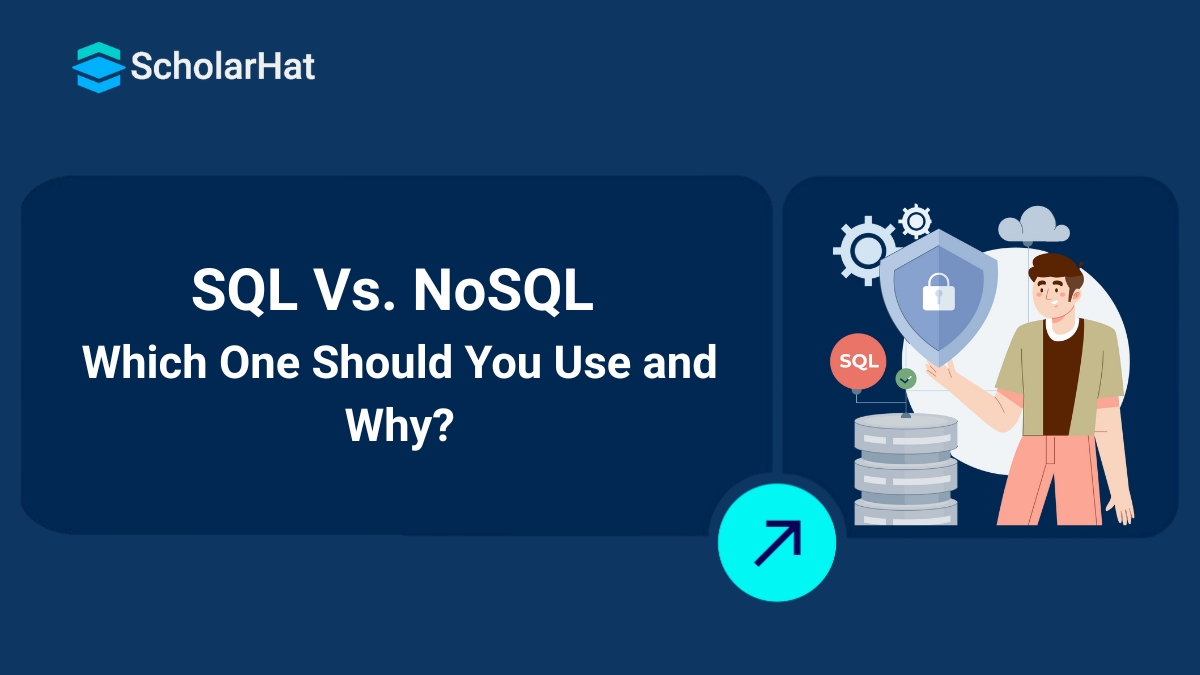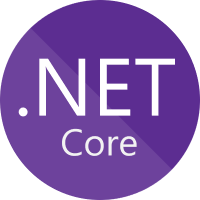20
FebSQL Vs. NoSQL: Difference Between SQL and NoSQL Database
SQL and NoSQL databases are used in real-world applications but serve different purposes. The Difference Between SQL and NoSQL databaseis that SQL databases store structured data, making them ideal for banking and e-commerce, while NoSQL databases handle unstructured data, perfect for social media and real-time analytics.
In the SQL Server Tutorial, understanding the Difference Between SQL and NoSQL Database helps in choosing the right database. Banks and airlines use SQL for accuracy, while Facebook and Netflix rely on NoSQL for scalability. Selecting the right database depends on the project’s needs. SQL Server powers 45% of enterprise database systems. Don’t get left behind—join our SQL Server Training Online Free today!
What is an SQL Database?
An SQL database is a relational database that stores data in structured tables using rows and columns. It follows a fixed schema, meaning the structure is predefined, and every piece of data must fit into it. SQL databases are best for situations where data consistency, accuracy, and complex queries are required.
Characteristics of SQL Databases
- Uses Structured Query Language (SQL): SQL helps store, retrieve, and manage data efficiently.
- Follows a Fixed Schema: Data must fit into predefined tables, ensuring organization and consistency.
- ACID Compliance: It ensures transactions are Atomic, Consistent, Isolated, and Durable, making them reliable for critical applications.
- Highly Structured Data Storage: Stores data in tables, making it easy to manage relationships between different data.
- Best for Complex Queries: Supports powerful queries using SQL commands like SELECT, JOIN, and WHERE.
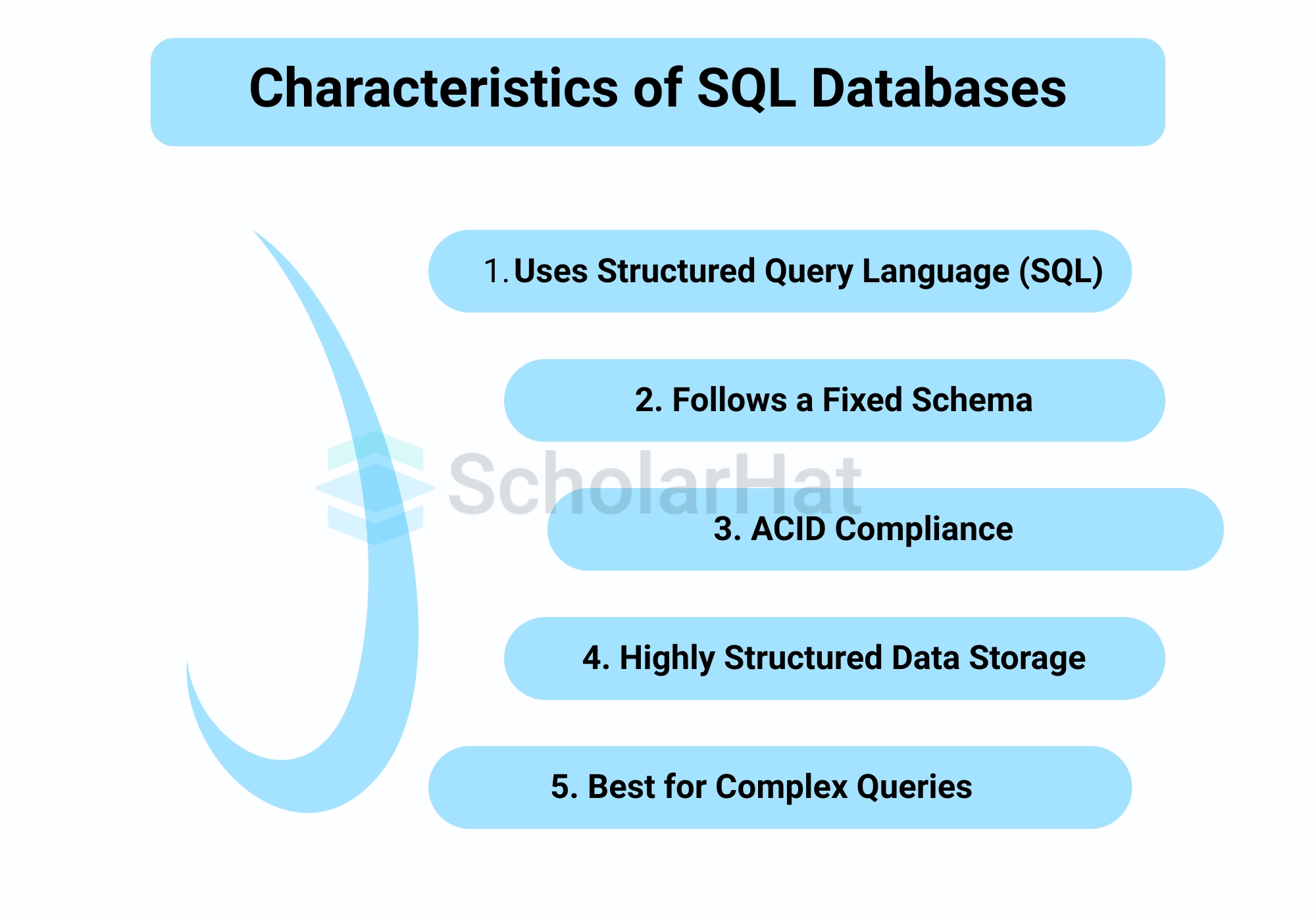
Examples of SQL Databases
- MySQL:An open-source SQL database used in web applications like WordPress.
- PostgreSQL: Advanced open-source database used by companies like Apple and Instagram.
- Oracle Database: Secure database used in banking and enterprise applications.
- Microsoft SQL Server:This is commonly used in corporate environments and enterprise software.
Real-World Applications of SQL Databases
- Banking Systems: Ensure secure transactions and accurate balances.
- E-commerce Platforms: Stores product details, customer info, and purchase history.
- Hospital Management Systems: Manages patient records and appointments.
- Online Booking Systems: Used in airline and hotel reservation platforms.
Why Should You Choose an SQL Database?
- If you need structured data storage with strict relationships.
- When you require high data integrity and security (e.g., financial applications).
- If your application needs to run complex queries and generate reports.
- When the data structure is stable and doesn’t change frequently.
SQL databases are reliable, secure, and efficient, making them perfect for applications that require structured data and strong consistency. However, for projects needing flexibility and high scalability, NoSQL databases may be a better choice.
What is a NoSQL Database?
A NoSQL database is a non-relational database designed to store structured, semi-structured, and unstructured data in a flexible way. Unlike SQL databases, which use a fixed schema, NoSQL databases allow you to store data dynamically without defining a strict structure. They are highly scalable, handle large volumes of data efficiently, and are often used for big data, real-time applications, and distributed systems.
Characteristics of NoSQL Databases
- Uses a Dynamic Schema: NoSQL databases don’t require a predefined table structure, making them ideal for rapidly changing data models.
- Supports Various Data Models: NoSQL databases use different storage formats:
- Document-Based (e.g., MongoDB): Stores data in JSON-like documents.
- Key-Value Store (e.g., Redis): Stores data as key-value pairs.
- Column-Family Store (e.g., Cassandra): Organizes data into columns instead of rows.
- Graph-based (e.g., Neo4j): Uses nodes and edges to store relationships between data.
- Highly Scalable and Distributed: Designed to scale horizontally by adding more servers as data grows.
- Follows BASE Properties: Uses Basically Available, Soft state, Eventually consistent principles for high availability.
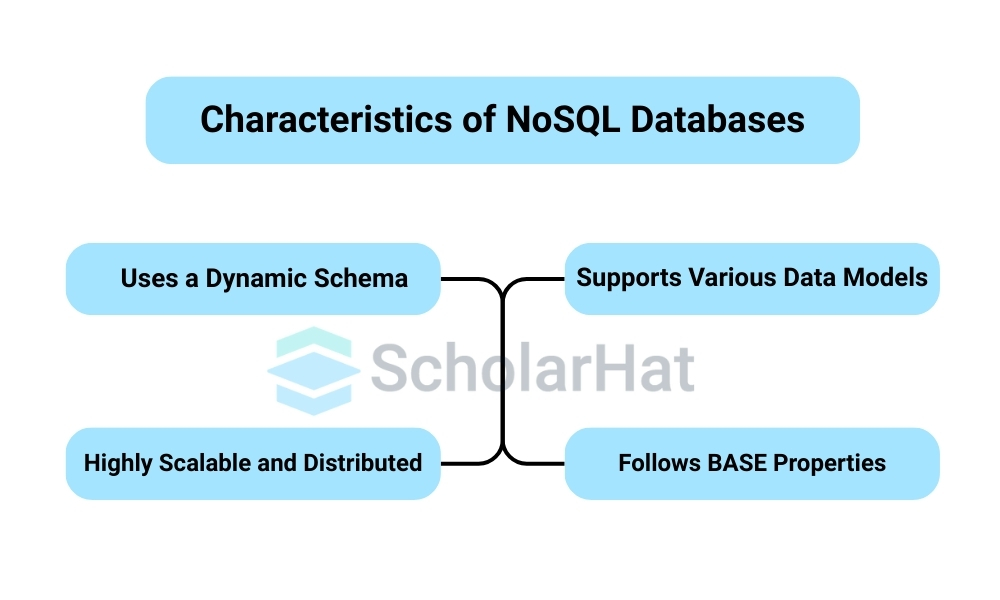
Examples of NoSQL Databases
- MongoDB: A document-based NoSQL database used by Facebook, eBay, and Adobe.
- Cassandra: A column-family NoSQL database used by Netflix, Twitter, and Spotify.
- Redis: A key-value NoSQL database used in caching and real-time applications.
- DynamoDB: A fully managed NoSQL database by AWS used in gaming and IoT.
Real-World Applications of NoSQL Databases
- Social Media Platforms:Facebook, Instagram, and Twitter are used to store posts and comments.
- E-commerce Websites: Amazon and eBay use NoSQL for product catalogs and real-time inventory.
- Big Data and Analytics: NoSQL databases are used in Hadoop to process massive datasets.
- IoT and Sensor Data: Stores unstructured data from smart devices and healthcare applications.
Why Should You Choose a NoSQL Database?
- If your application deals with large, unstructured, or semi-structured data.
- When scalability and high availability are more important than strict data consistency.
- If you are working on real-time applications like chat systems and streaming services.
- When you need fast read and write operations without worrying about a fixed schema.
NoSQL databases are fast, scalable, and flexible, making them perfect for modern applications that require high performance and real-time processing. However, if your project needs strict data consistency and complex queries, an SQL database may be a better choice.
Difference Between SQL and NoSQL Database
The difference between SQL and NoSQL databases is a crucial concept in modern data management. SQL databases follow a structured, relational approach using tables, while NoSQL databases provide flexibility by storing data in various formats like documents, key-value pairs, graphs, and column families. Understanding these differences helps in choosing the right database for different applications.
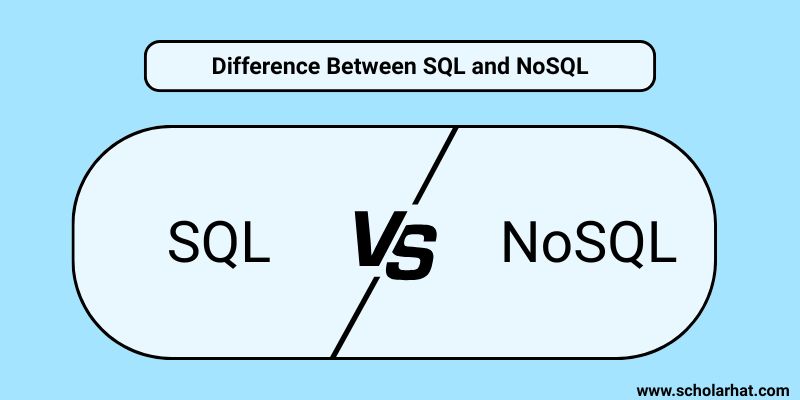
1. Data Structure
- One of the key differences between SQL and NoSQL database is how data is stored. SQL databases use a structured format with tables, rows, and columns. This ensures consistency and is ideal for transactional applications.
- NoSQL databases, on the other hand, are designed to handle semi-structured and unstructured data. They store information in flexible formats like JSON documents, key-value stores, or graph structures.
Example
A banking system needs an SQL database for structured transactions, while a social media app benefits from a NoSQL database for storing dynamic user content.
2. Schema Flexibility
- SQL databases require a predefined schema, meaning the structure of data must be set before use. This is useful for applications needing strict consistency.
- NoSQL databases offer schema flexibility, allowing you to store different types of data without a fixed structure. This is useful for big data applications and real-time analytics.
Example
An inventory system with fixed product categories works well with SQL, while an online marketplace with frequently changing attributes benefits from NoSQL.
3. Scalability
- The difference between SQL and NoSQL databases also extends to scalability. SQL databases scale vertically, meaning better hardware (CPU, RAM) is needed to handle increased load.
- NoSQL databases scale horizontally by distributing data across multiple servers, making them better for handling large-scale applications.
Example
A small retail business can use an SQL database, while companies like Amazon and Facebook use NoSQL for massive user data management.
4. Performance & Speed
- SQL databases excel in structured data retrieval but can slow down when handling extremely large datasets.
- NoSQL databases are optimized for fast read and write operations, making them ideal for real-time applications like messaging and streaming services.
Example
A traditional e-commerce site uses MySQL (SQL), while a chat application like WhatsApp uses NoSQL (MongoDB).
5. Transactions & Consistency
- SQL databases follow ACID (Atomicity, Consistency, Isolation, Durability) principles, ensuring reliable and consistent data.
- NoSQL databases follow BASE (Basically Available, Soft state, Eventually consistent), prioritizing availability and scalability over strict consistency.
Example
Banking systems require SQL for strict financial transactions, whereas NoSQL databases power social media feeds, where slight delays are acceptable.
6. Use Cases
Choosing between SQL and NoSQL depends on the application's needs. SQL is best for structured, relational data, while NoSQL is better for flexible, high-performance needs.
Example
Netflix uses NoSQL for its recommendation system, while airline reservation systems rely on SQL databases for structured bookings.
Conclusion
In conclusion, the difference between SQL and NoSQL databases lies in their structure, scalability, and use cases. SQL is the best choice for structured, relational data where consistency is key, while NoSQL is ideal for high-performance, flexible applications handling unstructured data.
Understanding the difference between SQL and NoSQL databases is essential for selecting the right database for your project. If you need structured data with complex relationships, go for SQL. If you need high-speed performance, scalability, and flexibility, go for NoSQL.
The tech industry needs full-stack .NET experts, with 22% job growth projected by 2026. Join our Full-Stack .NET Developer Certification and lead the way!
Test your skills by following MCQs
Dear learners, MCQs are a simple and fun way to test your knowledge. Try them and see how much you’ve learned!
Q 1: Which database type uses structured tables with rows and columns?
FAQs
Take our Sqlserver skill challenge to evaluate yourself!

In less than 5 minutes, with our skill challenge, you can identify your knowledge gaps and strengths in a given skill.

